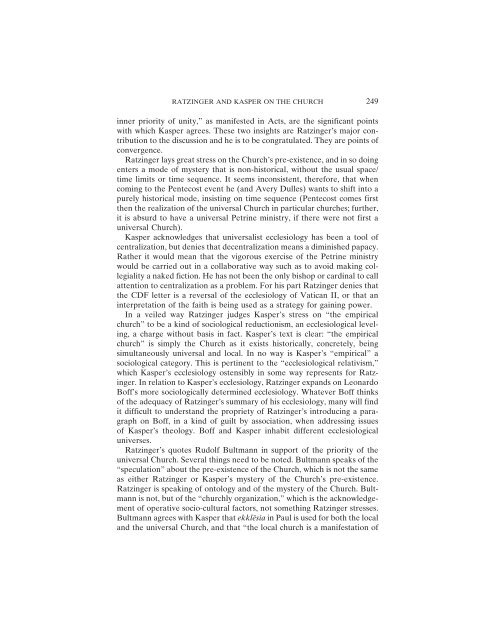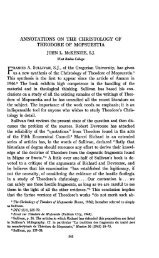the ratzinger/kasper debate - Theological Studies
the ratzinger/kasper debate - Theological Studies
the ratzinger/kasper debate - Theological Studies
Create successful ePaper yourself
Turn your PDF publications into a flip-book with our unique Google optimized e-Paper software.
RATZINGER AND KASPER ON THE CHURCH<br />
inner priority of unity,” as manifested in Acts, are <strong>the</strong> significant points<br />
with which Kasper agrees. These two insights are Ratzinger’s major contribution<br />
to <strong>the</strong> discussion and he is to be congratulated. They are points of<br />
convergence.<br />
Ratzinger lays great stress on <strong>the</strong> Church’s pre-existence, and in so doing<br />
enters a mode of mystery that is non-historical, without <strong>the</strong> usual space/<br />
time limits or time sequence. It seems inconsistent, <strong>the</strong>refore, that when<br />
coming to <strong>the</strong> Pentecost event he (and Avery Dulles) wants to shift into a<br />
purely historical mode, insisting on time sequence (Pentecost comes first<br />
<strong>the</strong>n <strong>the</strong> realization of <strong>the</strong> universal Church in particular churches; fur<strong>the</strong>r,<br />
it is absurd to have a universal Petrine ministry, if <strong>the</strong>re were not first a<br />
universal Church).<br />
Kasper acknowledges that universalist ecclesiology has been a tool of<br />
centralization, but denies that decentralization means a diminished papacy.<br />
Ra<strong>the</strong>r it would mean that <strong>the</strong> vigorous exercise of <strong>the</strong> Petrine ministry<br />
would be carried out in a collaborative way such as to avoid making collegiality<br />
a naked fiction. He has not been <strong>the</strong> only bishop or cardinal to call<br />
attention to centralization as a problem. For his part Ratzinger denies that<br />
<strong>the</strong> CDF letter is a reversal of <strong>the</strong> ecclesiology of Vatican II, or that an<br />
interpretation of <strong>the</strong> faith is being used as a strategy for gaining power.<br />
In a veiled way Ratzinger judges Kasper’s stress on “<strong>the</strong> empirical<br />
church” to be a kind of sociological reductionism, an ecclesiological leveling,<br />
a charge without basis in fact. Kasper’s text is clear: “<strong>the</strong> empirical<br />
church” is simply <strong>the</strong> Church as it exists historically, concretely, being<br />
simultaneously universal and local. In no way is Kasper’s “empirical” a<br />
sociological category. This is pertinent to <strong>the</strong> “ecclesiological relativism,”<br />
which Kasper’s ecclesiology ostensibly in some way represents for Ratzinger.<br />
In relation to Kasper’s ecclesiology, Ratzinger expands on Leonardo<br />
Boff’s more sociologically determined ecclesiology. Whatever Boff thinks<br />
of <strong>the</strong> adequacy of Ratzinger’s summary of his ecclesiology, many will find<br />
it difficult to understand <strong>the</strong> propriety of Ratzinger’s introducing a paragraph<br />
on Boff, in a kind of guilt by association, when addressing issues<br />
of Kasper’s <strong>the</strong>ology. Boff and Kasper inhabit different ecclesiological<br />
universes.<br />
Ratzinger’s quotes Rudolf Bultmann in support of <strong>the</strong> priority of <strong>the</strong><br />
universal Church. Several things need to be noted. Bultmann speaks of <strong>the</strong><br />
“speculation” about <strong>the</strong> pre-existence of <strong>the</strong> Church, which is not <strong>the</strong> same<br />
as ei<strong>the</strong>r Ratzinger or Kasper’s mystery of <strong>the</strong> Church’s pre-existence.<br />
Ratzinger is speaking of ontology and of <strong>the</strong> mystery of <strong>the</strong> Church. Bultmann<br />
is not, but of <strong>the</strong> “churchly organization,” which is <strong>the</strong> acknowledgement<br />
of operative socio-cultural factors, not something Ratzinger stresses.<br />
Bultmann agrees with Kasper that ekklēsia in Paul is used for both <strong>the</strong> local<br />
and <strong>the</strong> universal Church, and that “<strong>the</strong> local church is a manifestation of<br />
249

















